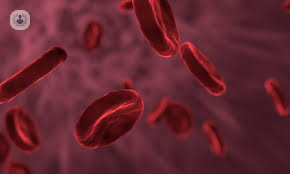Coagulopathy
Coagulopathy (also called a bleeding disorder) is a condition where the blood’s ability to coagulate (form clots) is affected.
They can be congenital (such as haemophilia, Von Wilebrand disease or hereditary platelet diseases) or acquired (caused by a defective synthesis of plasma coagulation factors or by the absorption of antibodies that attack blood clotting functions.
In the latter case, most common causes may be poor diet that does not provide the necessary substances, intestinal malabsorption or the consumption of drugs that hinder the absorption of vitamin K.
Prognostic of the disease
Certain types of coagulopathy do not allow blood to clot. Some types of coagulopathies are characterised by hypercoagulation (excessive blood clotting) which can result in thrombosis or embolism. Both are disorders that can cause premature death if they’re not treated adequately.

The most common symptoms of a coagulopathy are the following:
- Bruising that occurs for no apparent reason
- Hermathrosis (bleeding into a joint cavity)
- Haemorrhage after childbirth
- Accumulation of blood in the pleural cavity (hemothorax)
- Very heavy menstrual flow
- Loss of blood through the nose
- Anal bleeding
- Blood in the urine
- Blood in the sperm
- Livedo reticularis
- Thrombocytopenia
- Persistent involuntary and painful erection of the penis (priapism)
- Gingival bleeding
- Rheumatisms
- Bloody gums
- Joint pain and swelling
Diagnostic of a Coagulopathy
The diagnostic is based on an objective analysis of the habits of a patient, for example. the type of medication they’re taking, if they suffer from allergies, if they’ve had a blood transfusion and if they smoke or drink. It is also based on the medical history of the patient, blood analysis and tests to evaluate blood clotting.
What are the causes of coagulopathy?
A coagulopathy occurs when the clotting is deficient or inexistent. The factors that allow for coagulation, are protein that permit the formation of blood clots. Its absence or deficiency can be the result of various causes including
- Genetic conditions such as haemophilia, Von Willebrand Disease for example.
- Acquired factors such as anticoagulant medicines (blood thinners), the continued use of antibiotics, liver disease or disseminated intravascular coagulation
Can it be prevented?
Especially in the case of blood clotting that is extremely quick (that can favour the appearance of thrombosis), it can be a good idea for individuals who are at high risk of developing a coagulation disorder to carry out preventative lifestyle changes.
Exercise, losing weight and not sitting down for too long can reduce the symptoms of coagulation disorders.
Treatment for a coagulopathy
The haematologist can consider it to be necessary to prescribe medication such as:
- Medications that prevent the formation of blood clots
- Contraceptive pills to counteract the excessive bleeding during menstruation
- Medication that substitutes protein in the blood to ensure you do not excessively bleed
Which specialist should you consult with?
A haematologist would be able to advise you on an appropriate test and suitable treatments for blood clotting disorders.